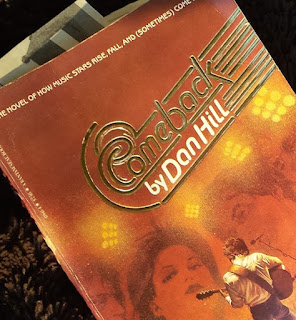Things have been pretty quiet here, I know. Much of these past two weeks has been taken up by other writing and promotion of
The Dusty Bookcase – the book. This is not to say I haven't found time to read. Just yesterday I finished
Comeback, the 1983 novel by Dan Hill, brother of Lawrence. It's one of the most unusual books read in this journey through Canada's forgotten, neglected, and suppressed writing. For reasons outlined in my review, which should follow in a few days, it is also one of the most disturbing. A
roman à clef infused with self-loathing and sex scenes, at time of publication
Maclean's dismissed
Comeback as "soft-porn."
Because used copies listed online begin at C$115 ("20 pages throughout the book have splatter stains" – coffee, I hope), I present these excerpts.
You may wish to close your eyes and hide.
1
She felt awkward – no man had undressed her before. Her legs were pressed so tightly together that he finally had to pull off her suit in hurried jerky motions. She felt his warm breath against the opening of her vagina. As his hands opened her legs she shuddered and whispered. "No – please – don't."
"It's alright," he murmured, his breath pounding into her, "it's alright."
2
Her nipples felt as soft and pliant as the erasers at the tip of a pencil, but her breasts were hard and unyielding – like a pair of Prince Edward Island potatoes
3
She drew my mouth against hers, kissing me with unusual tenderness, but the moment I closed my eyes she slid her hand into the salad bowl, scooped up a handful of grapes, and dropping them down the front of my pants. I squawked indignantly, sliding down the refrigerator and toppling on the floor, pulling her down on top of me as I fell. The salad bowl hit the floor with a crack and I slid it out of our way, leaving Maria and me a good double bed's worth of space to flop around in.
4
"You can touch it if you like."
I timidly obliged.
"Now trace your way down...slowly...softly...until you reach the opening.... That's right...hmmmmm...hmmmm...that's right, you're catching on...just a little at a time.... Oooohhhh, that feels like...hmmmm...like you've got the knack of it...."
5
She started running her hand up and down my thigh, as if I were nothing more than an extension of the bedspread, something that needed to be unwrinkled, smoothed over.
6
I felt her hands pull down my pants, felt her mouth take me in – gradually, a little at a time. My body stiffened, coiling itself up for impending release. I tried to step away. But she clasped her hands around my buttocks and drew me closer, deeper, and I lost myself to the sensation sweeping through me like a waterfall. I started falling to the floor – I didn't care – and my hands grabbed hold of her shoulders, pulling her with me. Somehow her mouth stayed fastened to me – my body curled around either side of her face – her mouth still sucking long after the last drop had trailed down her throat.
Sadly, this has now lost its innocence:













